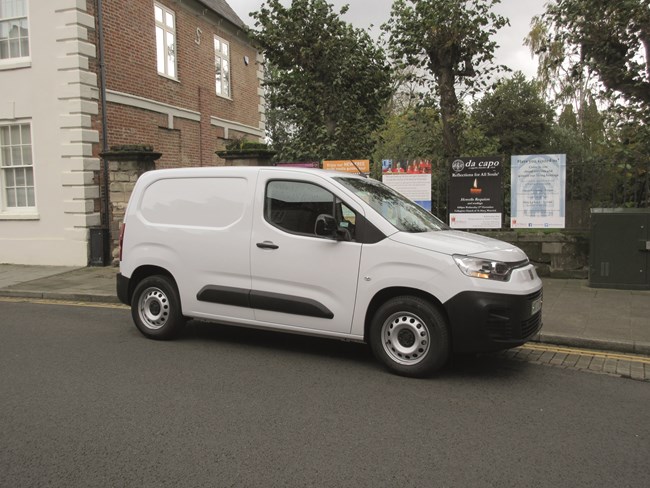- ETRUX launches new Ford E-Transit Trizone
- Renault gives UK debut to Master E-Tech at CV Show
- Isuzu D-Max long-term test – Latest Report
- Isuzu D-Max V-Cross Steel Edition revealed
- IVOTY Report: Stellantis explores the hydrogen proposition
- New Maxus EVs include eDeliver 5 van
- Used LCV values reach six-month high
- ADVERTISEMENT FEATURE: IVECO Daily Mission Awards 2024 Q2 Round-up: Grounds Maintenance & Forestry
- Stellantis Pro One electric vans review
- Mitie adds 5,000th EV to fleet
Fiat Professional: Electric takes the lead
Date: Monday, November 21, 2022 | Author: Steve Banner
Fiat Professional’s plug-in compact van will be available to UK customers before its ICE counterparts.

The electric version of Fiat Professional’s new Doblo will arrive in the UK just ahead of its diesel and petrol stablemates as interest in zero-emission technology continues to soar.
The first E-Doblos could be in the hands of customers before Christmas, with conventionally-powered variants set to appear in January.
“We expect the electric version to account for 15% of Doblo sales,” said Richard Chamberlain, UK director of commercial vehicles at Stellantis and responsible for the van activities of Citroën, Peugeot and Vauxhall as well as for Fiat Professional. With a 20p-plus gap between the price of a litre of petrol and a litre of diesel at the time of writing, the new petrol Doblo could account for perhaps 10% of registrations assuming the price differential is maintained, he adds.
While a prominent Fiat badge on the bonnet helps give it a distinctive identity, the latest Doblo shares the same basic design as Citroën’s Berlingo, Peugeot’s Partner, and Vauxhall’s Combo. The same model is also sold through Toyota dealerships under the Proace City banner thanks to a joint venture agreement between Stellantis and the Japanese giant.
With a claimed range of up to 175 miles, a 100kW electric motor and a 50kWh battery said to be capable of being recharged to 80% of its capacity in 30 minutes, E-Doblo should help
Fiat Professional fulfil its stated aim of playing a key role in zero-emission last-mile urban delivery. It already has E-Scudo and E-Ducato on sale to cater for businesses that need more carrying capability.
E-Doblo payload capacity is up to 800kg, and it can tow a trailer grossing at up to 1,000kg.
Doblo is marketed with a 1.5L diesel engine at either 100hp or 130hp and a 1.2L petrol engine at 110hp. The more powerful of the two diesels is listed with an automatic gearbox as an option.
Both Doblo and E-Doblo are offered in short and long-wheelbase guise, with cargo volumes of 3.3m3 and 3.9m3 respectively. The long-wheelbase variant can also be ordered as a crew van.
Customers can pick from two trim levels; Standard or the more-upmarket Primo. All models come with air-conditioning with Primo adding a reversing camera, a load-through bulkhead and a dual passenger seat among other goodies to the specification mix.
Heavy stress is being placed on Level 2 Advanced Driver Assistance Systems (ADAS) across the range.
Safety devices available include the Magic Mirror. Two cameras – one under the right rear-view mirror, the other above the rear doors – delivering views displayed on a 5in digital rear-view mirror make it easier for the driver to perform complex manoeuvres, says the manufacturer.
On offer too are Adaptive Cruise Control, Lane Keeping Assist and Blind Spot Detection.
While much will depend on the government’s approach to taxation and public spending, Chamberlain expects total van sales to enjoy a modest increase in 2023.
The scale of the increase will be influenced by product availability. “There are still component shortages,” he said, and those shortages are continuing to result in extended lead times across the industry.
Factor in model changes, and anybody who orders a new Ducato from the factory today may have to wait until the second quarter of 2023 before it appears, according to Chamberlain. Scudo delivery times are more encouraging however – order one from the factory and you should receive it by the end of the first quarter of next year – and while the situation cannot as yet be described as satisfactory, customers are not having to wait as long for Fiat Professional vehicles as they did a year ago.
“This year Fiat Professional is likely to sell just short of 10,000 vehicles in the UK,” Chamberlain predicted. “Better supplies should mean we’ll get up to between 12,000 and 15,000 in 2023.”
For now, those supplies will still include the compact Fiorino Cargo. “We’re planning for it to continue,” said Chamberlain.
That said, the cost of complying with the forthcoming Euro 7 exhaust emission rules due in 2025/26 could affect its future.
Obliging manufacturers to invest in order to meet Euro 7 limits is causing concern within the industry given that diesel and petrol engines have only a limited shelf life. The UK government plans to ban sales of new ICE cars and vans from 2030 onwards.
If such a ban is to work however, then far more emphasis will need to be placed on improving the country’s charging infrastructure, warns Chamberlain.
Stellantis is developing versions of some of its models that can run on zero-emission hydrogen fuel cells, but he believes it will be sometime before they have a significant role to play on this side of the Channel. “There just isn’t a hydrogen refuelling infrastructure in the UK,” Chamberlain said.
“What we need to do is make full use of the zero-emission technology we’ve already got,” he added. “That means battery-electric.”
View The WhatVan Digital Edition


